Principles of Health and Social Care: Implementing Support in HSC
VerifiedAdded on 2020/01/21
|14
|5128
|43
Report
AI Summary
This report delves into the core principles of health and social care (HSC), focusing on how these principles are implemented in practice, especially for individuals with learning difficulties. It covers the importance of person-centered approaches, ethical dilemmas faced by care workers, and procedures for protecting clients and colleagues from harm. The report also examines the impact of policies, legislation, regulations, and codes of practice on organizational policies and practices within HSC settings. Furthermore, it explores the theories that underpin HSC practice and the effectiveness of inter-professional working. Finally, the report discusses the author's role and responsibilities in contributing to the development and implementation of HSC organizational policy, offering recommendations for improving practice.
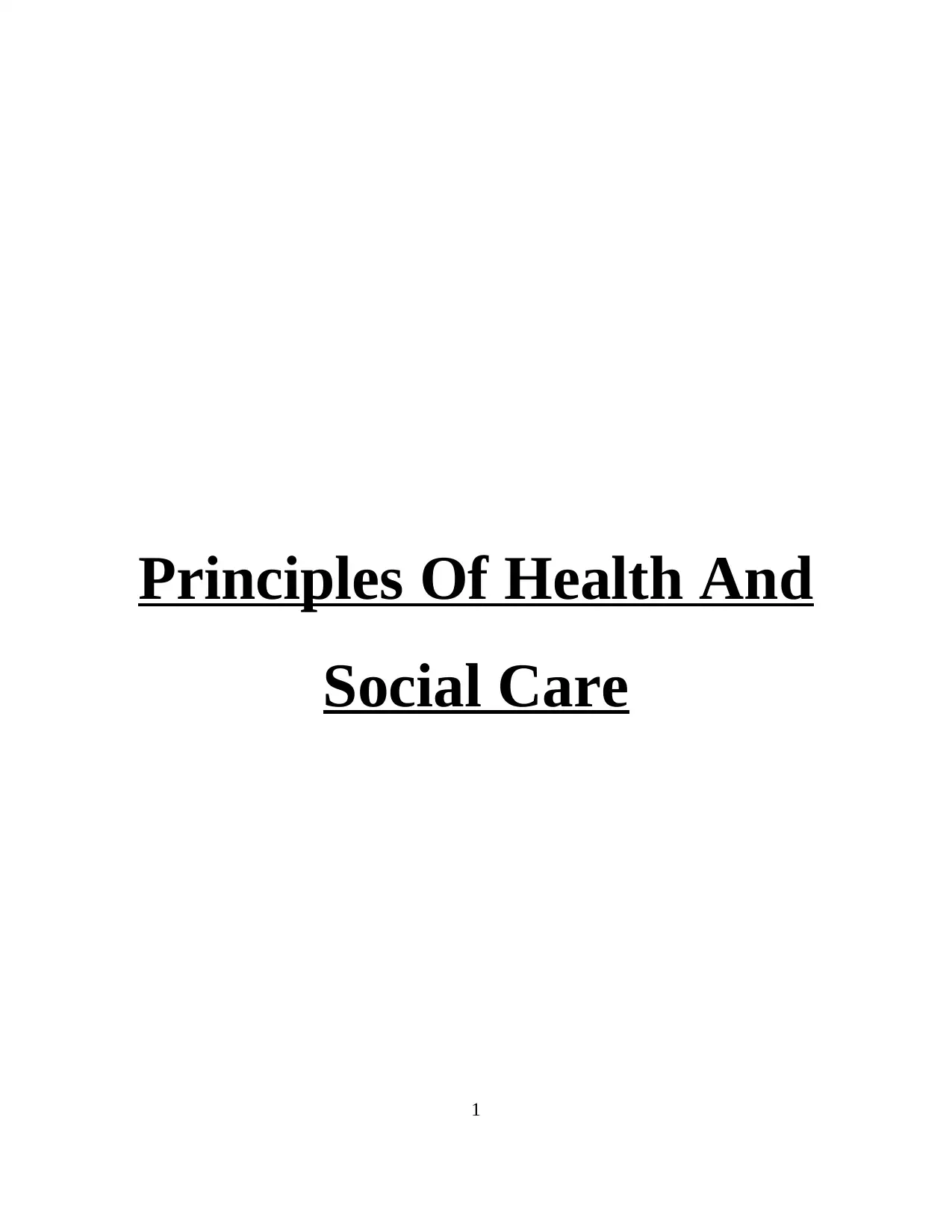
Principles Of Health And
Social Care
1
Social Care
1
Paraphrase This Document
Need a fresh take? Get an instant paraphrase of this document with our AI Paraphraser
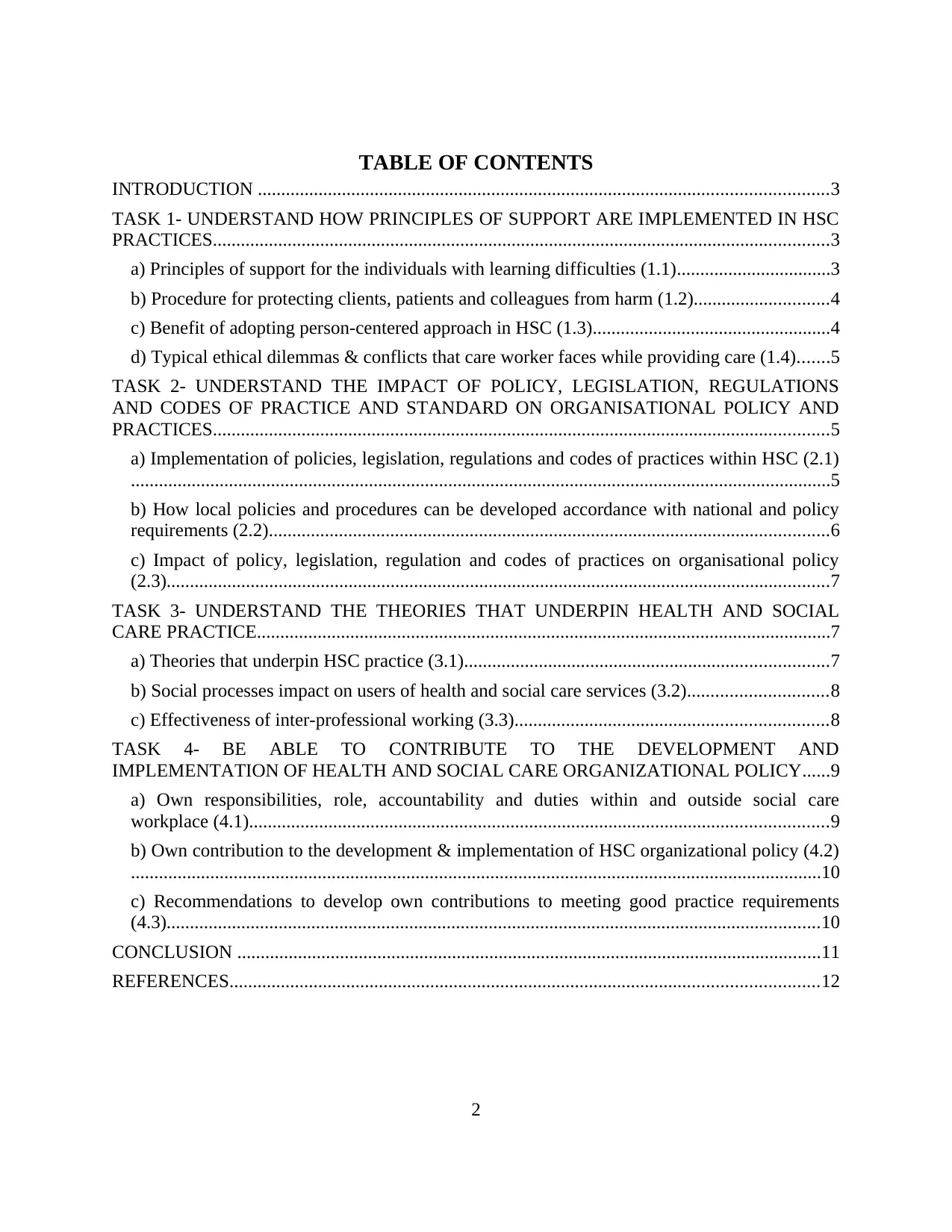
TABLE OF CONTENTS
INTRODUCTION ..........................................................................................................................3
TASK 1- UNDERSTAND HOW PRINCIPLES OF SUPPORT ARE IMPLEMENTED IN HSC
PRACTICES....................................................................................................................................3
a) Principles of support for the individuals with learning difficulties (1.1).................................3
b) Procedure for protecting clients, patients and colleagues from harm (1.2).............................4
c) Benefit of adopting person-centered approach in HSC (1.3)...................................................4
d) Typical ethical dilemmas & conflicts that care worker faces while providing care (1.4).......5
TASK 2- UNDERSTAND THE IMPACT OF POLICY, LEGISLATION, REGULATIONS
AND CODES OF PRACTICE AND STANDARD ON ORGANISATIONAL POLICY AND
PRACTICES....................................................................................................................................5
a) Implementation of policies, legislation, regulations and codes of practices within HSC (2.1)
......................................................................................................................................................5
b) How local policies and procedures can be developed accordance with national and policy
requirements (2.2)........................................................................................................................6
c) Impact of policy, legislation, regulation and codes of practices on organisational policy
(2.3)..............................................................................................................................................7
TASK 3- UNDERSTAND THE THEORIES THAT UNDERPIN HEALTH AND SOCIAL
CARE PRACTICE...........................................................................................................................7
a) Theories that underpin HSC practice (3.1)..............................................................................7
b) Social processes impact on users of health and social care services (3.2)..............................8
c) Effectiveness of inter-professional working (3.3)...................................................................8
TASK 4- BE ABLE TO CONTRIBUTE TO THE DEVELOPMENT AND
IMPLEMENTATION OF HEALTH AND SOCIAL CARE ORGANIZATIONAL POLICY......9
a) Own responsibilities, role, accountability and duties within and outside social care
workplace (4.1)............................................................................................................................9
b) Own contribution to the development & implementation of HSC organizational policy (4.2)
....................................................................................................................................................10
c) Recommendations to develop own contributions to meeting good practice requirements
(4.3)............................................................................................................................................10
CONCLUSION .............................................................................................................................11
REFERENCES..............................................................................................................................12
2
INTRODUCTION ..........................................................................................................................3
TASK 1- UNDERSTAND HOW PRINCIPLES OF SUPPORT ARE IMPLEMENTED IN HSC
PRACTICES....................................................................................................................................3
a) Principles of support for the individuals with learning difficulties (1.1).................................3
b) Procedure for protecting clients, patients and colleagues from harm (1.2).............................4
c) Benefit of adopting person-centered approach in HSC (1.3)...................................................4
d) Typical ethical dilemmas & conflicts that care worker faces while providing care (1.4).......5
TASK 2- UNDERSTAND THE IMPACT OF POLICY, LEGISLATION, REGULATIONS
AND CODES OF PRACTICE AND STANDARD ON ORGANISATIONAL POLICY AND
PRACTICES....................................................................................................................................5
a) Implementation of policies, legislation, regulations and codes of practices within HSC (2.1)
......................................................................................................................................................5
b) How local policies and procedures can be developed accordance with national and policy
requirements (2.2)........................................................................................................................6
c) Impact of policy, legislation, regulation and codes of practices on organisational policy
(2.3)..............................................................................................................................................7
TASK 3- UNDERSTAND THE THEORIES THAT UNDERPIN HEALTH AND SOCIAL
CARE PRACTICE...........................................................................................................................7
a) Theories that underpin HSC practice (3.1)..............................................................................7
b) Social processes impact on users of health and social care services (3.2)..............................8
c) Effectiveness of inter-professional working (3.3)...................................................................8
TASK 4- BE ABLE TO CONTRIBUTE TO THE DEVELOPMENT AND
IMPLEMENTATION OF HEALTH AND SOCIAL CARE ORGANIZATIONAL POLICY......9
a) Own responsibilities, role, accountability and duties within and outside social care
workplace (4.1)............................................................................................................................9
b) Own contribution to the development & implementation of HSC organizational policy (4.2)
....................................................................................................................................................10
c) Recommendations to develop own contributions to meeting good practice requirements
(4.3)............................................................................................................................................10
CONCLUSION .............................................................................................................................11
REFERENCES..............................................................................................................................12
2
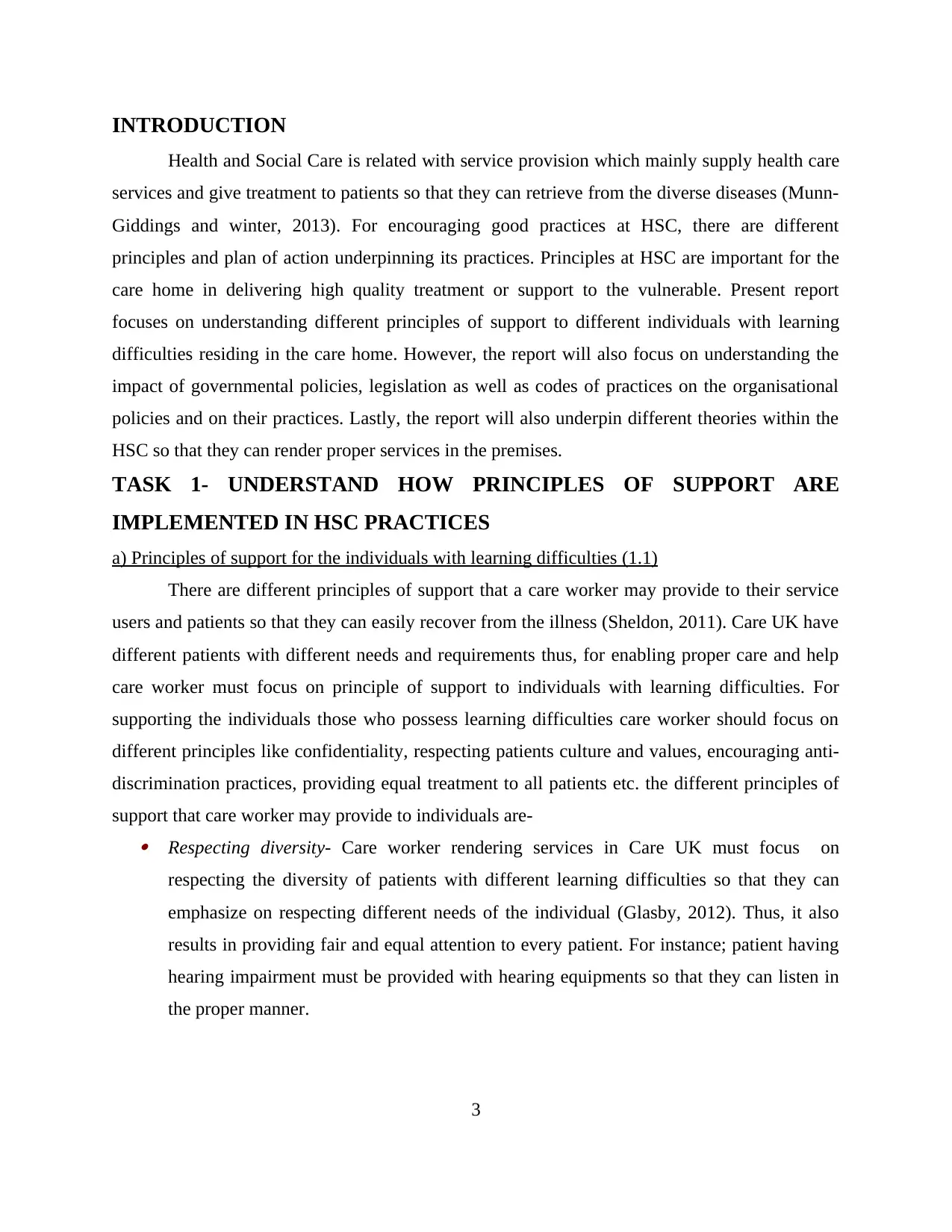
INTRODUCTION
Health and Social Care is related with service provision which mainly supply health care
services and give treatment to patients so that they can retrieve from the diverse diseases (Munn-
Giddings and winter, 2013). For encouraging good practices at HSC, there are different
principles and plan of action underpinning its practices. Principles at HSC are important for the
care home in delivering high quality treatment or support to the vulnerable. Present report
focuses on understanding different principles of support to different individuals with learning
difficulties residing in the care home. However, the report will also focus on understanding the
impact of governmental policies, legislation as well as codes of practices on the organisational
policies and on their practices. Lastly, the report will also underpin different theories within the
HSC so that they can render proper services in the premises.
TASK 1- UNDERSTAND HOW PRINCIPLES OF SUPPORT ARE
IMPLEMENTED IN HSC PRACTICES
a) Principles of support for the individuals with learning difficulties (1.1)
There are different principles of support that a care worker may provide to their service
users and patients so that they can easily recover from the illness (Sheldon, 2011). Care UK have
different patients with different needs and requirements thus, for enabling proper care and help
care worker must focus on principle of support to individuals with learning difficulties. For
supporting the individuals those who possess learning difficulties care worker should focus on
different principles like confidentiality, respecting patients culture and values, encouraging anti-
discrimination practices, providing equal treatment to all patients etc. the different principles of
support that care worker may provide to individuals are- Respecting diversity- Care worker rendering services in Care UK must focus on
respecting the diversity of patients with different learning difficulties so that they can
emphasize on respecting different needs of the individual (Glasby, 2012). Thus, it also
results in providing fair and equal attention to every patient. For instance; patient having
hearing impairment must be provided with hearing equipments so that they can listen in
the proper manner.
3
Health and Social Care is related with service provision which mainly supply health care
services and give treatment to patients so that they can retrieve from the diverse diseases (Munn-
Giddings and winter, 2013). For encouraging good practices at HSC, there are different
principles and plan of action underpinning its practices. Principles at HSC are important for the
care home in delivering high quality treatment or support to the vulnerable. Present report
focuses on understanding different principles of support to different individuals with learning
difficulties residing in the care home. However, the report will also focus on understanding the
impact of governmental policies, legislation as well as codes of practices on the organisational
policies and on their practices. Lastly, the report will also underpin different theories within the
HSC so that they can render proper services in the premises.
TASK 1- UNDERSTAND HOW PRINCIPLES OF SUPPORT ARE
IMPLEMENTED IN HSC PRACTICES
a) Principles of support for the individuals with learning difficulties (1.1)
There are different principles of support that a care worker may provide to their service
users and patients so that they can easily recover from the illness (Sheldon, 2011). Care UK have
different patients with different needs and requirements thus, for enabling proper care and help
care worker must focus on principle of support to individuals with learning difficulties. For
supporting the individuals those who possess learning difficulties care worker should focus on
different principles like confidentiality, respecting patients culture and values, encouraging anti-
discrimination practices, providing equal treatment to all patients etc. the different principles of
support that care worker may provide to individuals are- Respecting diversity- Care worker rendering services in Care UK must focus on
respecting the diversity of patients with different learning difficulties so that they can
emphasize on respecting different needs of the individual (Glasby, 2012). Thus, it also
results in providing fair and equal attention to every patient. For instance; patient having
hearing impairment must be provided with hearing equipments so that they can listen in
the proper manner.
3
⊘ This is a preview!⊘
Do you want full access?
Subscribe today to unlock all pages.

Trusted by 1+ million students worldwide
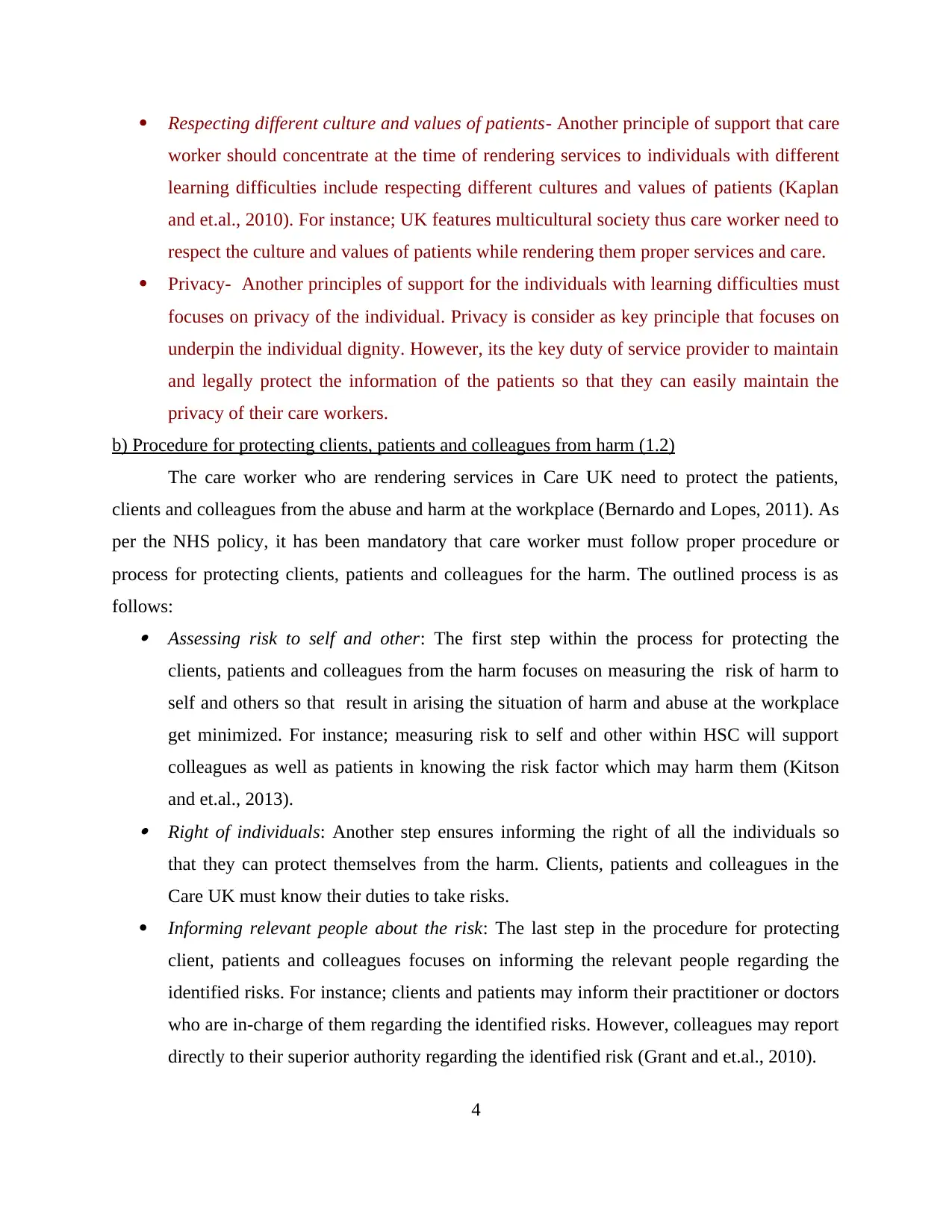
Respecting different culture and values of patients- Another principle of support that care
worker should concentrate at the time of rendering services to individuals with different
learning difficulties include respecting different cultures and values of patients (Kaplan
and et.al., 2010). For instance; UK features multicultural society thus care worker need to
respect the culture and values of patients while rendering them proper services and care.
Privacy- Another principles of support for the individuals with learning difficulties must
focuses on privacy of the individual. Privacy is consider as key principle that focuses on
underpin the individual dignity. However, its the key duty of service provider to maintain
and legally protect the information of the patients so that they can easily maintain the
privacy of their care workers.
b) Procedure for protecting clients, patients and colleagues from harm (1.2)
The care worker who are rendering services in Care UK need to protect the patients,
clients and colleagues from the abuse and harm at the workplace (Bernardo and Lopes, 2011). As
per the NHS policy, it has been mandatory that care worker must follow proper procedure or
process for protecting clients, patients and colleagues for the harm. The outlined process is as
follows: Assessing risk to self and other: The first step within the process for protecting the
clients, patients and colleagues from the harm focuses on measuring the risk of harm to
self and others so that result in arising the situation of harm and abuse at the workplace
get minimized. For instance; measuring risk to self and other within HSC will support
colleagues as well as patients in knowing the risk factor which may harm them (Kitson
and et.al., 2013). Right of individuals: Another step ensures informing the right of all the individuals so
that they can protect themselves from the harm. Clients, patients and colleagues in the
Care UK must know their duties to take risks.
Informing relevant people about the risk: The last step in the procedure for protecting
client, patients and colleagues focuses on informing the relevant people regarding the
identified risks. For instance; clients and patients may inform their practitioner or doctors
who are in-charge of them regarding the identified risks. However, colleagues may report
directly to their superior authority regarding the identified risk (Grant and et.al., 2010).
4
worker should concentrate at the time of rendering services to individuals with different
learning difficulties include respecting different cultures and values of patients (Kaplan
and et.al., 2010). For instance; UK features multicultural society thus care worker need to
respect the culture and values of patients while rendering them proper services and care.
Privacy- Another principles of support for the individuals with learning difficulties must
focuses on privacy of the individual. Privacy is consider as key principle that focuses on
underpin the individual dignity. However, its the key duty of service provider to maintain
and legally protect the information of the patients so that they can easily maintain the
privacy of their care workers.
b) Procedure for protecting clients, patients and colleagues from harm (1.2)
The care worker who are rendering services in Care UK need to protect the patients,
clients and colleagues from the abuse and harm at the workplace (Bernardo and Lopes, 2011). As
per the NHS policy, it has been mandatory that care worker must follow proper procedure or
process for protecting clients, patients and colleagues for the harm. The outlined process is as
follows: Assessing risk to self and other: The first step within the process for protecting the
clients, patients and colleagues from the harm focuses on measuring the risk of harm to
self and others so that result in arising the situation of harm and abuse at the workplace
get minimized. For instance; measuring risk to self and other within HSC will support
colleagues as well as patients in knowing the risk factor which may harm them (Kitson
and et.al., 2013). Right of individuals: Another step ensures informing the right of all the individuals so
that they can protect themselves from the harm. Clients, patients and colleagues in the
Care UK must know their duties to take risks.
Informing relevant people about the risk: The last step in the procedure for protecting
client, patients and colleagues focuses on informing the relevant people regarding the
identified risks. For instance; clients and patients may inform their practitioner or doctors
who are in-charge of them regarding the identified risks. However, colleagues may report
directly to their superior authority regarding the identified risk (Grant and et.al., 2010).
4
Paraphrase This Document
Need a fresh take? Get an instant paraphrase of this document with our AI Paraphraser
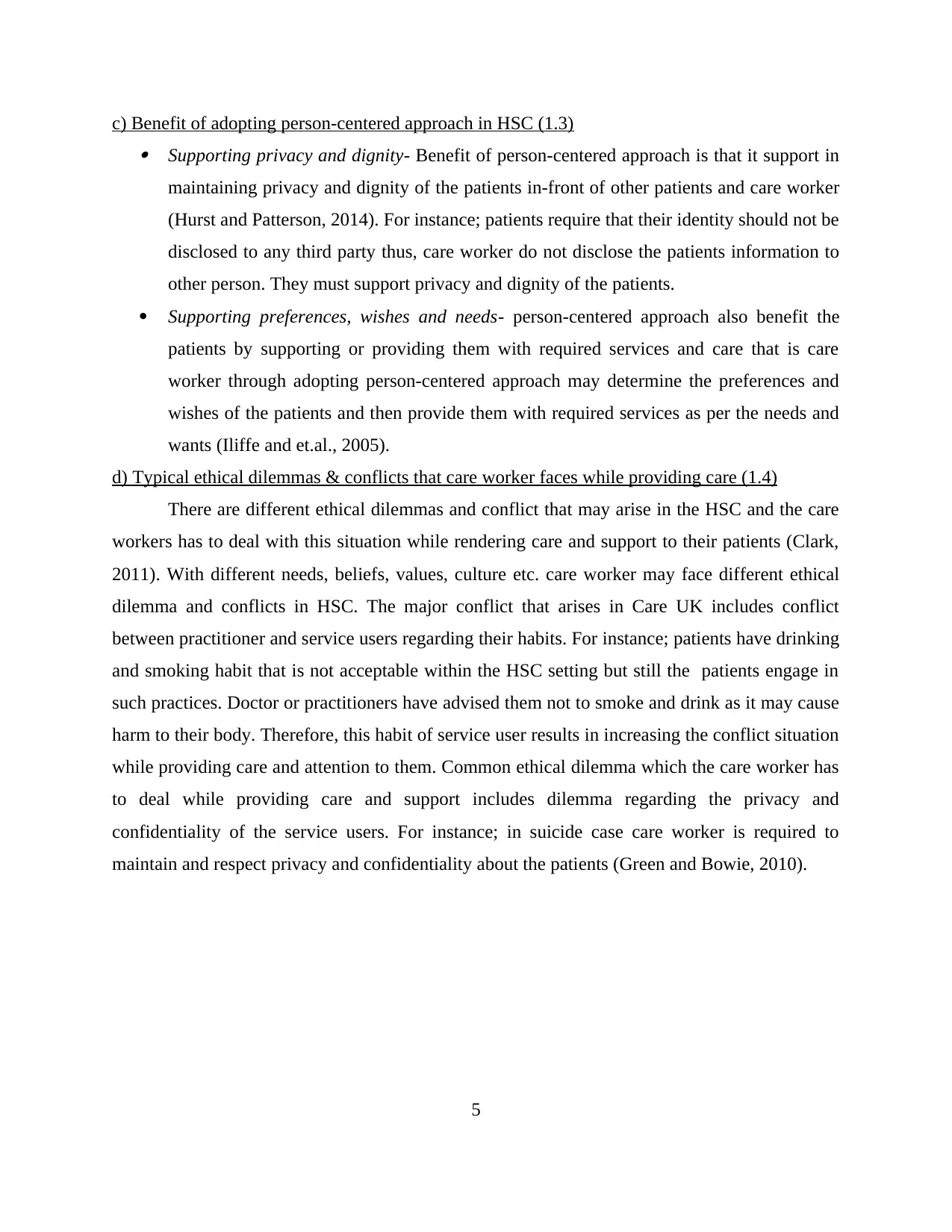
c) Benefit of adopting person-centered approach in HSC (1.3) Supporting privacy and dignity- Benefit of person-centered approach is that it support in
maintaining privacy and dignity of the patients in-front of other patients and care worker
(Hurst and Patterson, 2014). For instance; patients require that their identity should not be
disclosed to any third party thus, care worker do not disclose the patients information to
other person. They must support privacy and dignity of the patients.
Supporting preferences, wishes and needs- person-centered approach also benefit the
patients by supporting or providing them with required services and care that is care
worker through adopting person-centered approach may determine the preferences and
wishes of the patients and then provide them with required services as per the needs and
wants (Iliffe and et.al., 2005).
d) Typical ethical dilemmas & conflicts that care worker faces while providing care (1.4)
There are different ethical dilemmas and conflict that may arise in the HSC and the care
workers has to deal with this situation while rendering care and support to their patients (Clark,
2011). With different needs, beliefs, values, culture etc. care worker may face different ethical
dilemma and conflicts in HSC. The major conflict that arises in Care UK includes conflict
between practitioner and service users regarding their habits. For instance; patients have drinking
and smoking habit that is not acceptable within the HSC setting but still the patients engage in
such practices. Doctor or practitioners have advised them not to smoke and drink as it may cause
harm to their body. Therefore, this habit of service user results in increasing the conflict situation
while providing care and attention to them. Common ethical dilemma which the care worker has
to deal while providing care and support includes dilemma regarding the privacy and
confidentiality of the service users. For instance; in suicide case care worker is required to
maintain and respect privacy and confidentiality about the patients (Green and Bowie, 2010).
5
maintaining privacy and dignity of the patients in-front of other patients and care worker
(Hurst and Patterson, 2014). For instance; patients require that their identity should not be
disclosed to any third party thus, care worker do not disclose the patients information to
other person. They must support privacy and dignity of the patients.
Supporting preferences, wishes and needs- person-centered approach also benefit the
patients by supporting or providing them with required services and care that is care
worker through adopting person-centered approach may determine the preferences and
wishes of the patients and then provide them with required services as per the needs and
wants (Iliffe and et.al., 2005).
d) Typical ethical dilemmas & conflicts that care worker faces while providing care (1.4)
There are different ethical dilemmas and conflict that may arise in the HSC and the care
workers has to deal with this situation while rendering care and support to their patients (Clark,
2011). With different needs, beliefs, values, culture etc. care worker may face different ethical
dilemma and conflicts in HSC. The major conflict that arises in Care UK includes conflict
between practitioner and service users regarding their habits. For instance; patients have drinking
and smoking habit that is not acceptable within the HSC setting but still the patients engage in
such practices. Doctor or practitioners have advised them not to smoke and drink as it may cause
harm to their body. Therefore, this habit of service user results in increasing the conflict situation
while providing care and attention to them. Common ethical dilemma which the care worker has
to deal while providing care and support includes dilemma regarding the privacy and
confidentiality of the service users. For instance; in suicide case care worker is required to
maintain and respect privacy and confidentiality about the patients (Green and Bowie, 2010).
5
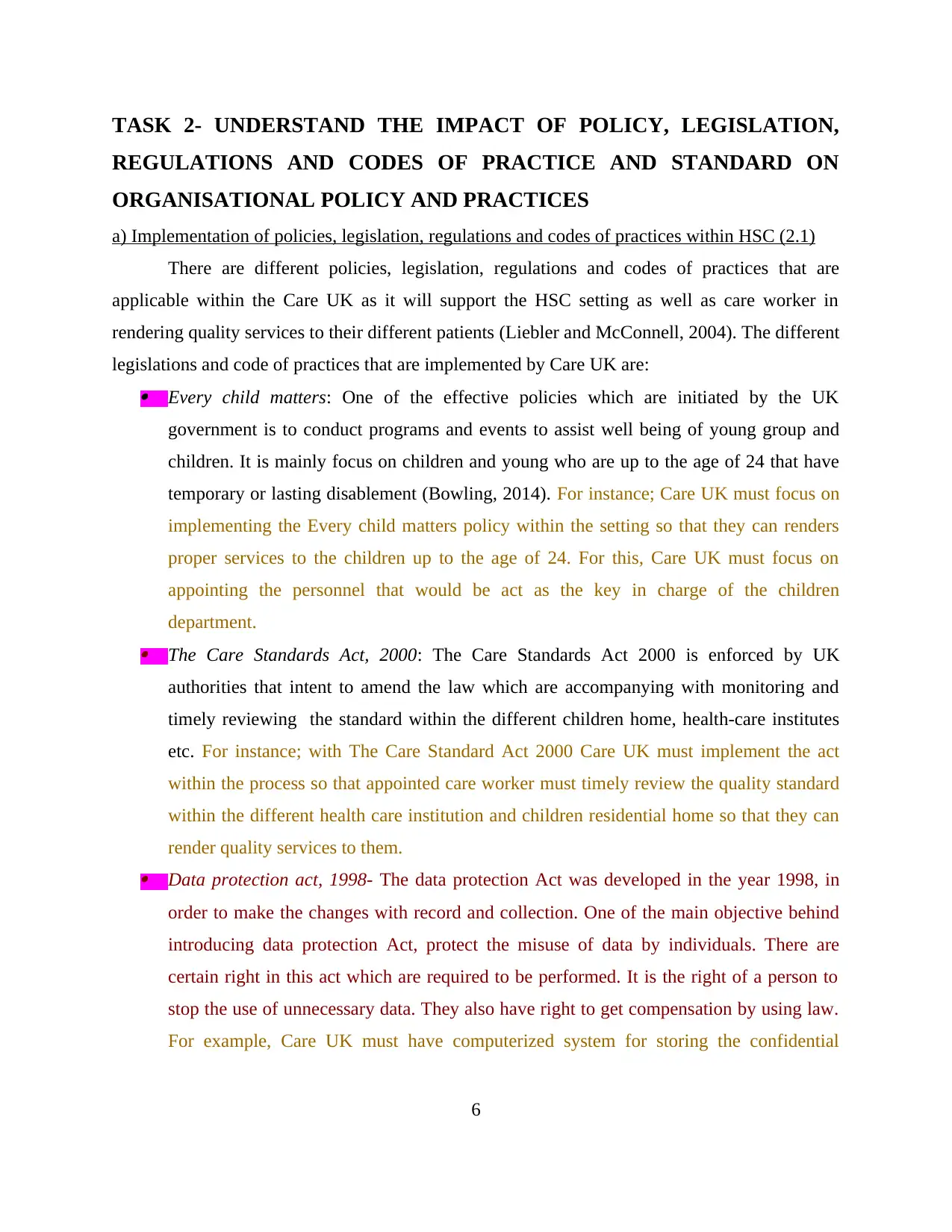
TASK 2- UNDERSTAND THE IMPACT OF POLICY, LEGISLATION,
REGULATIONS AND CODES OF PRACTICE AND STANDARD ON
ORGANISATIONAL POLICY AND PRACTICES
a) Implementation of policies, legislation, regulations and codes of practices within HSC (2.1)
There are different policies, legislation, regulations and codes of practices that are
applicable within the Care UK as it will support the HSC setting as well as care worker in
rendering quality services to their different patients (Liebler and McConnell, 2004). The different
legislations and code of practices that are implemented by Care UK are: Every child matters: One of the effective policies which are initiated by the UK
government is to conduct programs and events to assist well being of young group and
children. It is mainly focus on children and young who are up to the age of 24 that have
temporary or lasting disablement (Bowling, 2014). For instance; Care UK must focus on
implementing the Every child matters policy within the setting so that they can renders
proper services to the children up to the age of 24. For this, Care UK must focus on
appointing the personnel that would be act as the key in charge of the children
department. The Care Standards Act, 2000: The Care Standards Act 2000 is enforced by UK
authorities that intent to amend the law which are accompanying with monitoring and
timely reviewing the standard within the different children home, health-care institutes
etc. For instance; with The Care Standard Act 2000 Care UK must implement the act
within the process so that appointed care worker must timely review the quality standard
within the different health care institution and children residential home so that they can
render quality services to them. Data protection act, 1998- The data protection Act was developed in the year 1998, in
order to make the changes with record and collection. One of the main objective behind
introducing data protection Act, protect the misuse of data by individuals. There are
certain right in this act which are required to be performed. It is the right of a person to
stop the use of unnecessary data. They also have right to get compensation by using law.
For example, Care UK must have computerized system for storing the confidential
6
REGULATIONS AND CODES OF PRACTICE AND STANDARD ON
ORGANISATIONAL POLICY AND PRACTICES
a) Implementation of policies, legislation, regulations and codes of practices within HSC (2.1)
There are different policies, legislation, regulations and codes of practices that are
applicable within the Care UK as it will support the HSC setting as well as care worker in
rendering quality services to their different patients (Liebler and McConnell, 2004). The different
legislations and code of practices that are implemented by Care UK are: Every child matters: One of the effective policies which are initiated by the UK
government is to conduct programs and events to assist well being of young group and
children. It is mainly focus on children and young who are up to the age of 24 that have
temporary or lasting disablement (Bowling, 2014). For instance; Care UK must focus on
implementing the Every child matters policy within the setting so that they can renders
proper services to the children up to the age of 24. For this, Care UK must focus on
appointing the personnel that would be act as the key in charge of the children
department. The Care Standards Act, 2000: The Care Standards Act 2000 is enforced by UK
authorities that intent to amend the law which are accompanying with monitoring and
timely reviewing the standard within the different children home, health-care institutes
etc. For instance; with The Care Standard Act 2000 Care UK must implement the act
within the process so that appointed care worker must timely review the quality standard
within the different health care institution and children residential home so that they can
render quality services to them. Data protection act, 1998- The data protection Act was developed in the year 1998, in
order to make the changes with record and collection. One of the main objective behind
introducing data protection Act, protect the misuse of data by individuals. There are
certain right in this act which are required to be performed. It is the right of a person to
stop the use of unnecessary data. They also have right to get compensation by using law.
For example, Care UK must have computerized system for storing the confidential
6
⊘ This is a preview!⊘
Do you want full access?
Subscribe today to unlock all pages.

Trusted by 1+ million students worldwide
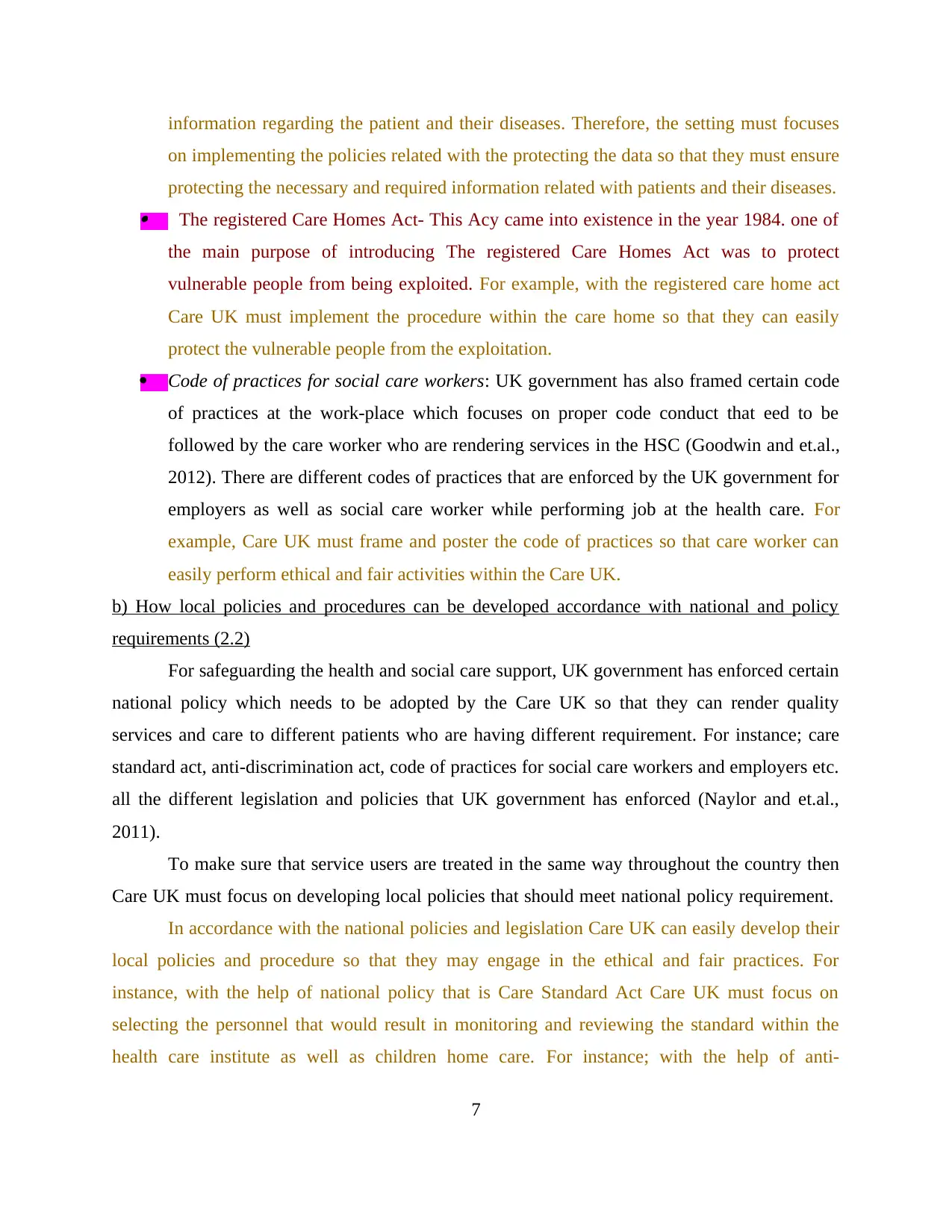
information regarding the patient and their diseases. Therefore, the setting must focuses
on implementing the policies related with the protecting the data so that they must ensure
protecting the necessary and required information related with patients and their diseases. The registered Care Homes Act- This Acy came into existence in the year 1984. one of
the main purpose of introducing The registered Care Homes Act was to protect
vulnerable people from being exploited. For example, with the registered care home act
Care UK must implement the procedure within the care home so that they can easily
protect the vulnerable people from the exploitation.
Code of practices for social care workers: UK government has also framed certain code
of practices at the work-place which focuses on proper code conduct that eed to be
followed by the care worker who are rendering services in the HSC (Goodwin and et.al.,
2012). There are different codes of practices that are enforced by the UK government for
employers as well as social care worker while performing job at the health care. For
example, Care UK must frame and poster the code of practices so that care worker can
easily perform ethical and fair activities within the Care UK.
b) How local policies and procedures can be developed accordance with national and policy
requirements (2.2)
For safeguarding the health and social care support, UK government has enforced certain
national policy which needs to be adopted by the Care UK so that they can render quality
services and care to different patients who are having different requirement. For instance; care
standard act, anti-discrimination act, code of practices for social care workers and employers etc.
all the different legislation and policies that UK government has enforced (Naylor and et.al.,
2011).
To make sure that service users are treated in the same way throughout the country then
Care UK must focus on developing local policies that should meet national policy requirement.
In accordance with the national policies and legislation Care UK can easily develop their
local policies and procedure so that they may engage in the ethical and fair practices. For
instance, with the help of national policy that is Care Standard Act Care UK must focus on
selecting the personnel that would result in monitoring and reviewing the standard within the
health care institute as well as children home care. For instance; with the help of anti-
7
on implementing the policies related with the protecting the data so that they must ensure
protecting the necessary and required information related with patients and their diseases. The registered Care Homes Act- This Acy came into existence in the year 1984. one of
the main purpose of introducing The registered Care Homes Act was to protect
vulnerable people from being exploited. For example, with the registered care home act
Care UK must implement the procedure within the care home so that they can easily
protect the vulnerable people from the exploitation.
Code of practices for social care workers: UK government has also framed certain code
of practices at the work-place which focuses on proper code conduct that eed to be
followed by the care worker who are rendering services in the HSC (Goodwin and et.al.,
2012). There are different codes of practices that are enforced by the UK government for
employers as well as social care worker while performing job at the health care. For
example, Care UK must frame and poster the code of practices so that care worker can
easily perform ethical and fair activities within the Care UK.
b) How local policies and procedures can be developed accordance with national and policy
requirements (2.2)
For safeguarding the health and social care support, UK government has enforced certain
national policy which needs to be adopted by the Care UK so that they can render quality
services and care to different patients who are having different requirement. For instance; care
standard act, anti-discrimination act, code of practices for social care workers and employers etc.
all the different legislation and policies that UK government has enforced (Naylor and et.al.,
2011).
To make sure that service users are treated in the same way throughout the country then
Care UK must focus on developing local policies that should meet national policy requirement.
In accordance with the national policies and legislation Care UK can easily develop their
local policies and procedure so that they may engage in the ethical and fair practices. For
instance, with the help of national policy that is Care Standard Act Care UK must focus on
selecting the personnel that would result in monitoring and reviewing the standard within the
health care institute as well as children home care. For instance; with the help of anti-
7
Paraphrase This Document
Need a fresh take? Get an instant paraphrase of this document with our AI Paraphraser
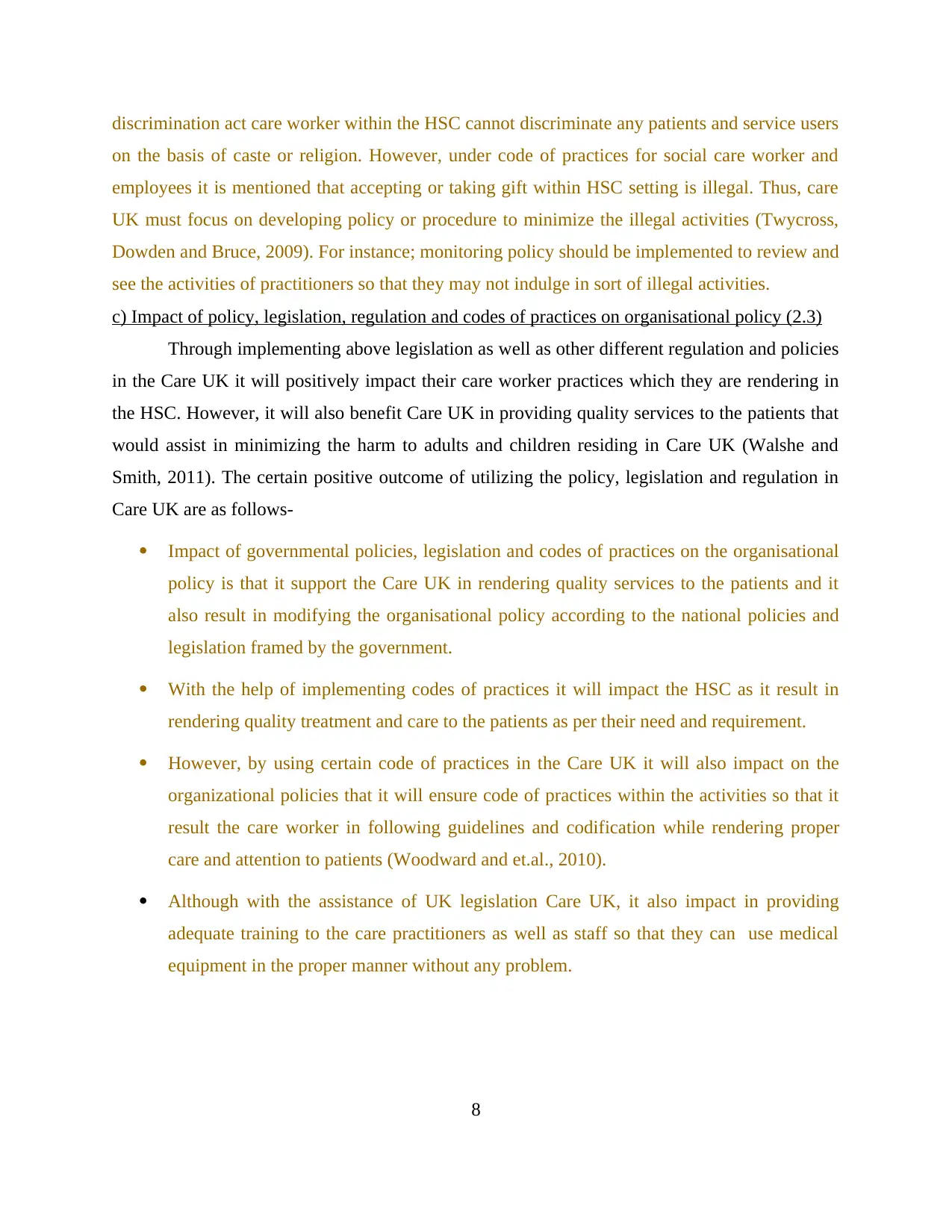
discrimination act care worker within the HSC cannot discriminate any patients and service users
on the basis of caste or religion. However, under code of practices for social care worker and
employees it is mentioned that accepting or taking gift within HSC setting is illegal. Thus, care
UK must focus on developing policy or procedure to minimize the illegal activities (Twycross,
Dowden and Bruce, 2009). For instance; monitoring policy should be implemented to review and
see the activities of practitioners so that they may not indulge in sort of illegal activities.
c) Impact of policy, legislation, regulation and codes of practices on organisational policy (2.3)
Through implementing above legislation as well as other different regulation and policies
in the Care UK it will positively impact their care worker practices which they are rendering in
the HSC. However, it will also benefit Care UK in providing quality services to the patients that
would assist in minimizing the harm to adults and children residing in Care UK (Walshe and
Smith, 2011). The certain positive outcome of utilizing the policy, legislation and regulation in
Care UK are as follows-
Impact of governmental policies, legislation and codes of practices on the organisational
policy is that it support the Care UK in rendering quality services to the patients and it
also result in modifying the organisational policy according to the national policies and
legislation framed by the government.
With the help of implementing codes of practices it will impact the HSC as it result in
rendering quality treatment and care to the patients as per their need and requirement.
However, by using certain code of practices in the Care UK it will also impact on the
organizational policies that it will ensure code of practices within the activities so that it
result the care worker in following guidelines and codification while rendering proper
care and attention to patients (Woodward and et.al., 2010).
Although with the assistance of UK legislation Care UK, it also impact in providing
adequate training to the care practitioners as well as staff so that they can use medical
equipment in the proper manner without any problem.
8
on the basis of caste or religion. However, under code of practices for social care worker and
employees it is mentioned that accepting or taking gift within HSC setting is illegal. Thus, care
UK must focus on developing policy or procedure to minimize the illegal activities (Twycross,
Dowden and Bruce, 2009). For instance; monitoring policy should be implemented to review and
see the activities of practitioners so that they may not indulge in sort of illegal activities.
c) Impact of policy, legislation, regulation and codes of practices on organisational policy (2.3)
Through implementing above legislation as well as other different regulation and policies
in the Care UK it will positively impact their care worker practices which they are rendering in
the HSC. However, it will also benefit Care UK in providing quality services to the patients that
would assist in minimizing the harm to adults and children residing in Care UK (Walshe and
Smith, 2011). The certain positive outcome of utilizing the policy, legislation and regulation in
Care UK are as follows-
Impact of governmental policies, legislation and codes of practices on the organisational
policy is that it support the Care UK in rendering quality services to the patients and it
also result in modifying the organisational policy according to the national policies and
legislation framed by the government.
With the help of implementing codes of practices it will impact the HSC as it result in
rendering quality treatment and care to the patients as per their need and requirement.
However, by using certain code of practices in the Care UK it will also impact on the
organizational policies that it will ensure code of practices within the activities so that it
result the care worker in following guidelines and codification while rendering proper
care and attention to patients (Woodward and et.al., 2010).
Although with the assistance of UK legislation Care UK, it also impact in providing
adequate training to the care practitioners as well as staff so that they can use medical
equipment in the proper manner without any problem.
8
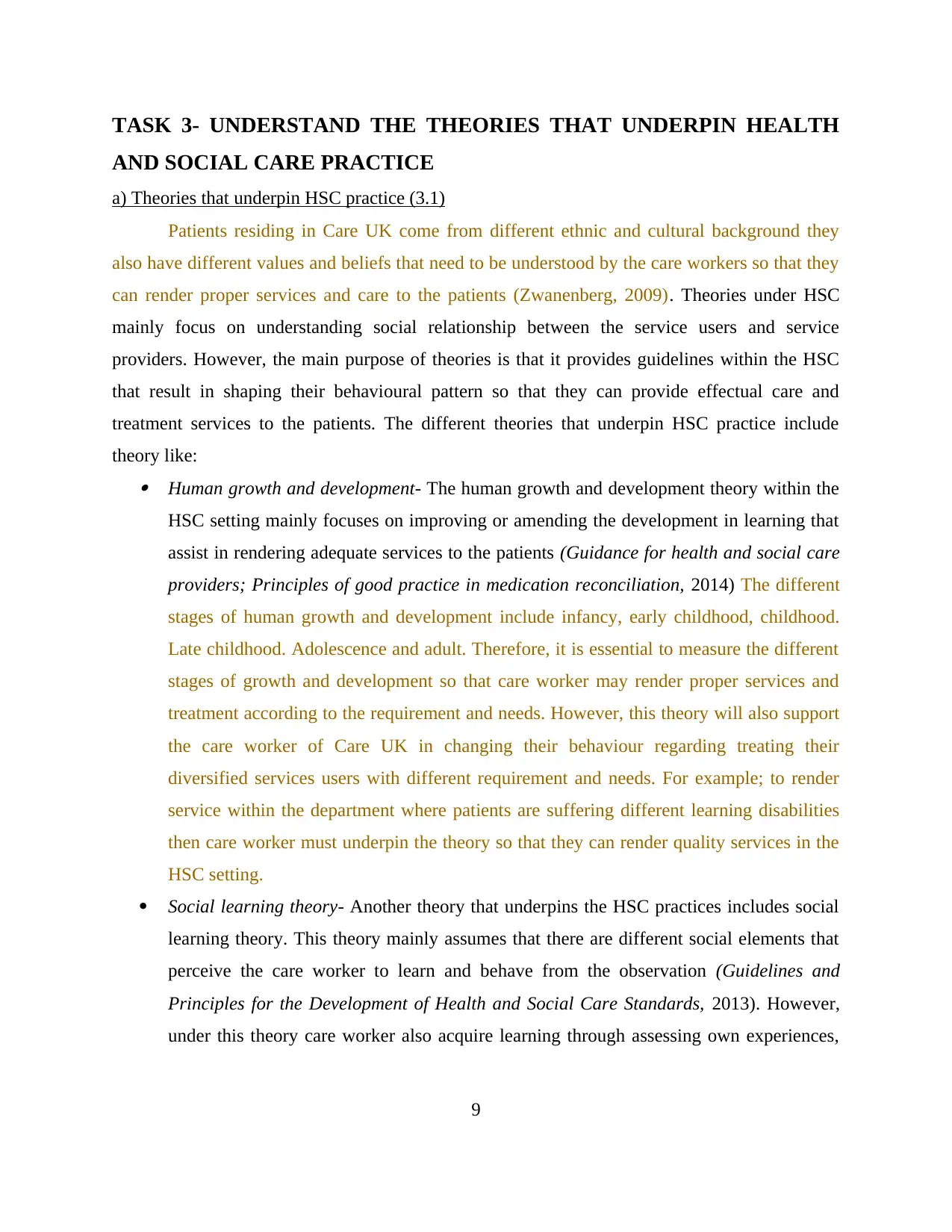
TASK 3- UNDERSTAND THE THEORIES THAT UNDERPIN HEALTH
AND SOCIAL CARE PRACTICE
a) Theories that underpin HSC practice (3.1)
Patients residing in Care UK come from different ethnic and cultural background they
also have different values and beliefs that need to be understood by the care workers so that they
can render proper services and care to the patients (Zwanenberg, 2009). Theories under HSC
mainly focus on understanding social relationship between the service users and service
providers. However, the main purpose of theories is that it provides guidelines within the HSC
that result in shaping their behavioural pattern so that they can provide effectual care and
treatment services to the patients. The different theories that underpin HSC practice include
theory like: Human growth and development- The human growth and development theory within the
HSC setting mainly focuses on improving or amending the development in learning that
assist in rendering adequate services to the patients (Guidance for health and social care
providers; Principles of good practice in medication reconciliation, 2014) The different
stages of human growth and development include infancy, early childhood, childhood.
Late childhood. Adolescence and adult. Therefore, it is essential to measure the different
stages of growth and development so that care worker may render proper services and
treatment according to the requirement and needs. However, this theory will also support
the care worker of Care UK in changing their behaviour regarding treating their
diversified services users with different requirement and needs. For example; to render
service within the department where patients are suffering different learning disabilities
then care worker must underpin the theory so that they can render quality services in the
HSC setting.
Social learning theory- Another theory that underpins the HSC practices includes social
learning theory. This theory mainly assumes that there are different social elements that
perceive the care worker to learn and behave from the observation (Guidelines and
Principles for the Development of Health and Social Care Standards, 2013). However,
under this theory care worker also acquire learning through assessing own experiences,
9
AND SOCIAL CARE PRACTICE
a) Theories that underpin HSC practice (3.1)
Patients residing in Care UK come from different ethnic and cultural background they
also have different values and beliefs that need to be understood by the care workers so that they
can render proper services and care to the patients (Zwanenberg, 2009). Theories under HSC
mainly focus on understanding social relationship between the service users and service
providers. However, the main purpose of theories is that it provides guidelines within the HSC
that result in shaping their behavioural pattern so that they can provide effectual care and
treatment services to the patients. The different theories that underpin HSC practice include
theory like: Human growth and development- The human growth and development theory within the
HSC setting mainly focuses on improving or amending the development in learning that
assist in rendering adequate services to the patients (Guidance for health and social care
providers; Principles of good practice in medication reconciliation, 2014) The different
stages of human growth and development include infancy, early childhood, childhood.
Late childhood. Adolescence and adult. Therefore, it is essential to measure the different
stages of growth and development so that care worker may render proper services and
treatment according to the requirement and needs. However, this theory will also support
the care worker of Care UK in changing their behaviour regarding treating their
diversified services users with different requirement and needs. For example; to render
service within the department where patients are suffering different learning disabilities
then care worker must underpin the theory so that they can render quality services in the
HSC setting.
Social learning theory- Another theory that underpins the HSC practices includes social
learning theory. This theory mainly assumes that there are different social elements that
perceive the care worker to learn and behave from the observation (Guidelines and
Principles for the Development of Health and Social Care Standards, 2013). However,
under this theory care worker also acquire learning through assessing own experiences,
9
⊘ This is a preview!⊘
Do you want full access?
Subscribe today to unlock all pages.

Trusted by 1+ million students worldwide
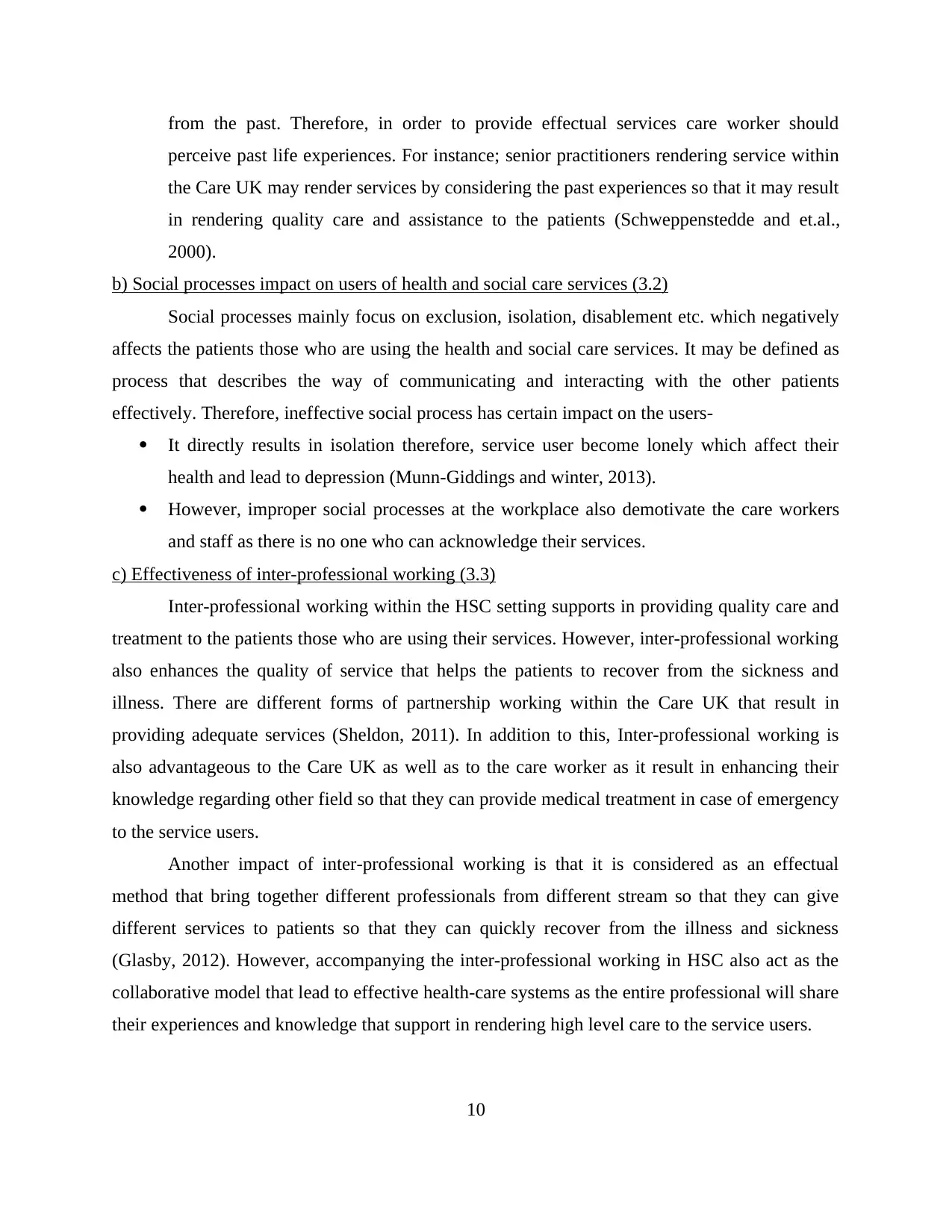
from the past. Therefore, in order to provide effectual services care worker should
perceive past life experiences. For instance; senior practitioners rendering service within
the Care UK may render services by considering the past experiences so that it may result
in rendering quality care and assistance to the patients (Schweppenstedde and et.al.,
2000).
b) Social processes impact on users of health and social care services (3.2)
Social processes mainly focus on exclusion, isolation, disablement etc. which negatively
affects the patients those who are using the health and social care services. It may be defined as
process that describes the way of communicating and interacting with the other patients
effectively. Therefore, ineffective social process has certain impact on the users-
It directly results in isolation therefore, service user become lonely which affect their
health and lead to depression (Munn-Giddings and winter, 2013).
However, improper social processes at the workplace also demotivate the care workers
and staff as there is no one who can acknowledge their services.
c) Effectiveness of inter-professional working (3.3)
Inter-professional working within the HSC setting supports in providing quality care and
treatment to the patients those who are using their services. However, inter-professional working
also enhances the quality of service that helps the patients to recover from the sickness and
illness. There are different forms of partnership working within the Care UK that result in
providing adequate services (Sheldon, 2011). In addition to this, Inter-professional working is
also advantageous to the Care UK as well as to the care worker as it result in enhancing their
knowledge regarding other field so that they can provide medical treatment in case of emergency
to the service users.
Another impact of inter-professional working is that it is considered as an effectual
method that bring together different professionals from different stream so that they can give
different services to patients so that they can quickly recover from the illness and sickness
(Glasby, 2012). However, accompanying the inter-professional working in HSC also act as the
collaborative model that lead to effective health-care systems as the entire professional will share
their experiences and knowledge that support in rendering high level care to the service users.
10
perceive past life experiences. For instance; senior practitioners rendering service within
the Care UK may render services by considering the past experiences so that it may result
in rendering quality care and assistance to the patients (Schweppenstedde and et.al.,
2000).
b) Social processes impact on users of health and social care services (3.2)
Social processes mainly focus on exclusion, isolation, disablement etc. which negatively
affects the patients those who are using the health and social care services. It may be defined as
process that describes the way of communicating and interacting with the other patients
effectively. Therefore, ineffective social process has certain impact on the users-
It directly results in isolation therefore, service user become lonely which affect their
health and lead to depression (Munn-Giddings and winter, 2013).
However, improper social processes at the workplace also demotivate the care workers
and staff as there is no one who can acknowledge their services.
c) Effectiveness of inter-professional working (3.3)
Inter-professional working within the HSC setting supports in providing quality care and
treatment to the patients those who are using their services. However, inter-professional working
also enhances the quality of service that helps the patients to recover from the sickness and
illness. There are different forms of partnership working within the Care UK that result in
providing adequate services (Sheldon, 2011). In addition to this, Inter-professional working is
also advantageous to the Care UK as well as to the care worker as it result in enhancing their
knowledge regarding other field so that they can provide medical treatment in case of emergency
to the service users.
Another impact of inter-professional working is that it is considered as an effectual
method that bring together different professionals from different stream so that they can give
different services to patients so that they can quickly recover from the illness and sickness
(Glasby, 2012). However, accompanying the inter-professional working in HSC also act as the
collaborative model that lead to effective health-care systems as the entire professional will share
their experiences and knowledge that support in rendering high level care to the service users.
10
Paraphrase This Document
Need a fresh take? Get an instant paraphrase of this document with our AI Paraphraser
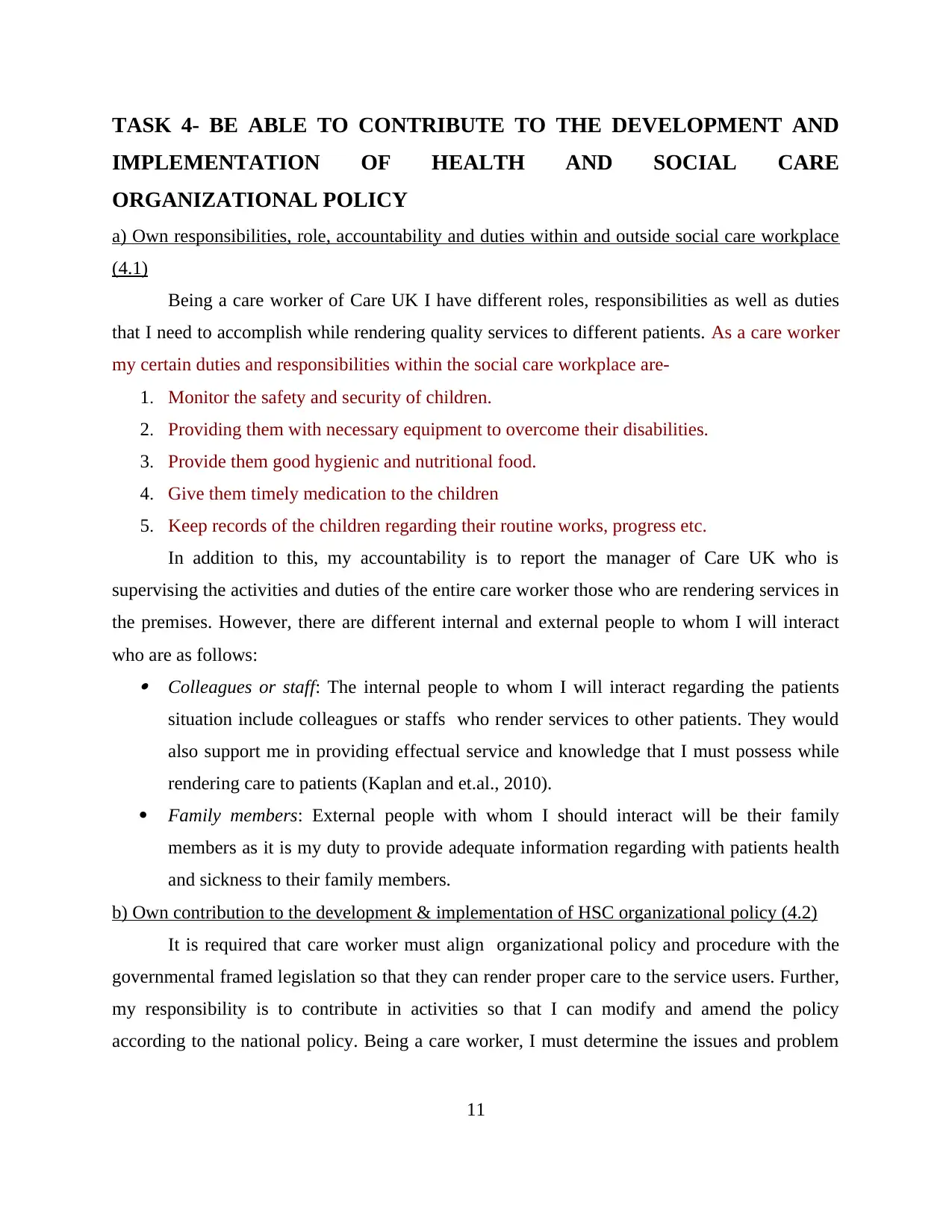
TASK 4- BE ABLE TO CONTRIBUTE TO THE DEVELOPMENT AND
IMPLEMENTATION OF HEALTH AND SOCIAL CARE
ORGANIZATIONAL POLICY
a) Own responsibilities, role, accountability and duties within and outside social care workplace
(4.1)
Being a care worker of Care UK I have different roles, responsibilities as well as duties
that I need to accomplish while rendering quality services to different patients. As a care worker
my certain duties and responsibilities within the social care workplace are-
1. Monitor the safety and security of children.
2. Providing them with necessary equipment to overcome their disabilities.
3. Provide them good hygienic and nutritional food.
4. Give them timely medication to the children
5. Keep records of the children regarding their routine works, progress etc.
In addition to this, my accountability is to report the manager of Care UK who is
supervising the activities and duties of the entire care worker those who are rendering services in
the premises. However, there are different internal and external people to whom I will interact
who are as follows: Colleagues or staff: The internal people to whom I will interact regarding the patients
situation include colleagues or staffs who render services to other patients. They would
also support me in providing effectual service and knowledge that I must possess while
rendering care to patients (Kaplan and et.al., 2010).
Family members: External people with whom I should interact will be their family
members as it is my duty to provide adequate information regarding with patients health
and sickness to their family members.
b) Own contribution to the development & implementation of HSC organizational policy (4.2)
It is required that care worker must align organizational policy and procedure with the
governmental framed legislation so that they can render proper care to the service users. Further,
my responsibility is to contribute in activities so that I can modify and amend the policy
according to the national policy. Being a care worker, I must determine the issues and problem
11
IMPLEMENTATION OF HEALTH AND SOCIAL CARE
ORGANIZATIONAL POLICY
a) Own responsibilities, role, accountability and duties within and outside social care workplace
(4.1)
Being a care worker of Care UK I have different roles, responsibilities as well as duties
that I need to accomplish while rendering quality services to different patients. As a care worker
my certain duties and responsibilities within the social care workplace are-
1. Monitor the safety and security of children.
2. Providing them with necessary equipment to overcome their disabilities.
3. Provide them good hygienic and nutritional food.
4. Give them timely medication to the children
5. Keep records of the children regarding their routine works, progress etc.
In addition to this, my accountability is to report the manager of Care UK who is
supervising the activities and duties of the entire care worker those who are rendering services in
the premises. However, there are different internal and external people to whom I will interact
who are as follows: Colleagues or staff: The internal people to whom I will interact regarding the patients
situation include colleagues or staffs who render services to other patients. They would
also support me in providing effectual service and knowledge that I must possess while
rendering care to patients (Kaplan and et.al., 2010).
Family members: External people with whom I should interact will be their family
members as it is my duty to provide adequate information regarding with patients health
and sickness to their family members.
b) Own contribution to the development & implementation of HSC organizational policy (4.2)
It is required that care worker must align organizational policy and procedure with the
governmental framed legislation so that they can render proper care to the service users. Further,
my responsibility is to contribute in activities so that I can modify and amend the policy
according to the national policy. Being a care worker, I must determine the issues and problem
11
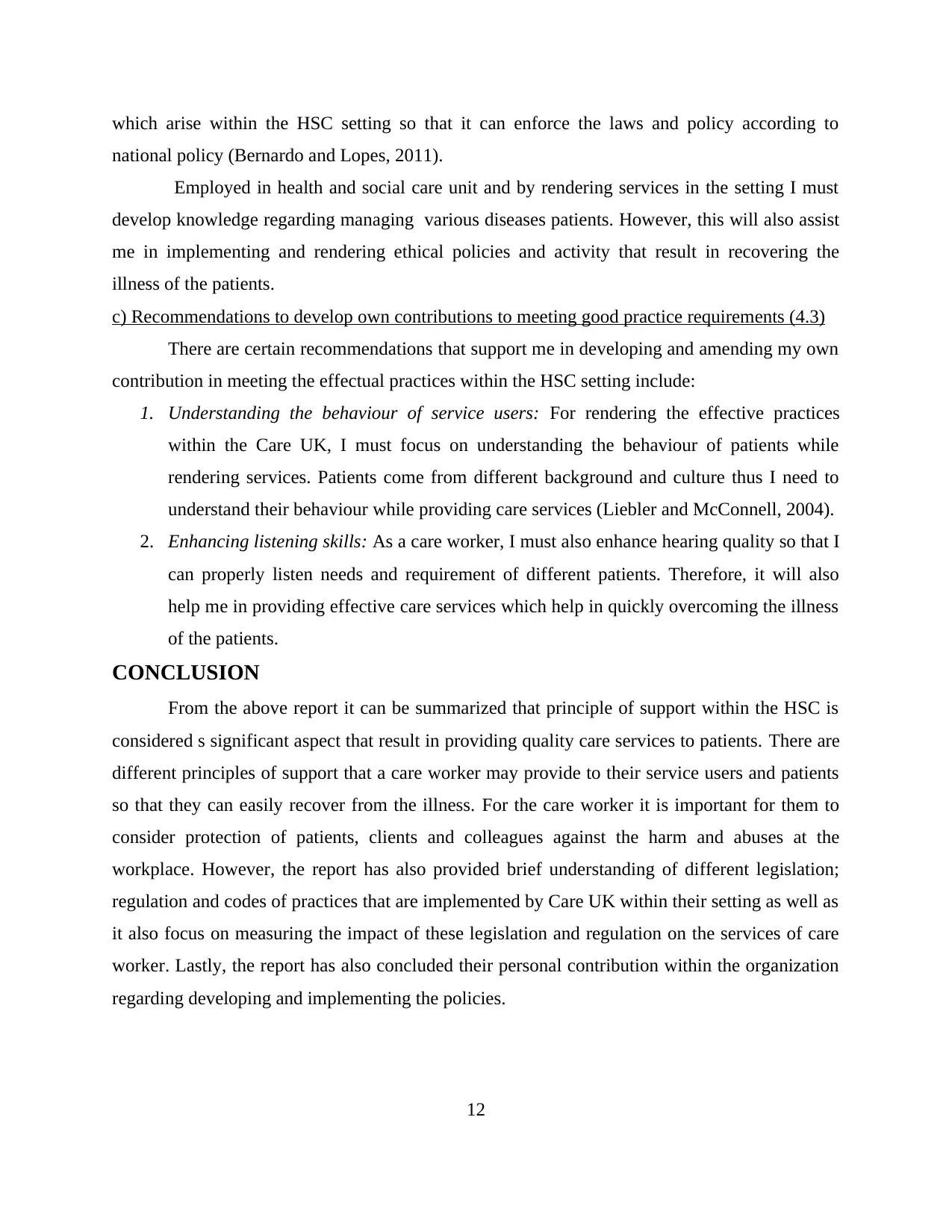
which arise within the HSC setting so that it can enforce the laws and policy according to
national policy (Bernardo and Lopes, 2011).
Employed in health and social care unit and by rendering services in the setting I must
develop knowledge regarding managing various diseases patients. However, this will also assist
me in implementing and rendering ethical policies and activity that result in recovering the
illness of the patients.
c) Recommendations to develop own contributions to meeting good practice requirements (4.3)
There are certain recommendations that support me in developing and amending my own
contribution in meeting the effectual practices within the HSC setting include:
1. Understanding the behaviour of service users: For rendering the effective practices
within the Care UK, I must focus on understanding the behaviour of patients while
rendering services. Patients come from different background and culture thus I need to
understand their behaviour while providing care services (Liebler and McConnell, 2004).
2. Enhancing listening skills: As a care worker, I must also enhance hearing quality so that I
can properly listen needs and requirement of different patients. Therefore, it will also
help me in providing effective care services which help in quickly overcoming the illness
of the patients.
CONCLUSION
From the above report it can be summarized that principle of support within the HSC is
considered s significant aspect that result in providing quality care services to patients. There are
different principles of support that a care worker may provide to their service users and patients
so that they can easily recover from the illness. For the care worker it is important for them to
consider protection of patients, clients and colleagues against the harm and abuses at the
workplace. However, the report has also provided brief understanding of different legislation;
regulation and codes of practices that are implemented by Care UK within their setting as well as
it also focus on measuring the impact of these legislation and regulation on the services of care
worker. Lastly, the report has also concluded their personal contribution within the organization
regarding developing and implementing the policies.
12
national policy (Bernardo and Lopes, 2011).
Employed in health and social care unit and by rendering services in the setting I must
develop knowledge regarding managing various diseases patients. However, this will also assist
me in implementing and rendering ethical policies and activity that result in recovering the
illness of the patients.
c) Recommendations to develop own contributions to meeting good practice requirements (4.3)
There are certain recommendations that support me in developing and amending my own
contribution in meeting the effectual practices within the HSC setting include:
1. Understanding the behaviour of service users: For rendering the effective practices
within the Care UK, I must focus on understanding the behaviour of patients while
rendering services. Patients come from different background and culture thus I need to
understand their behaviour while providing care services (Liebler and McConnell, 2004).
2. Enhancing listening skills: As a care worker, I must also enhance hearing quality so that I
can properly listen needs and requirement of different patients. Therefore, it will also
help me in providing effective care services which help in quickly overcoming the illness
of the patients.
CONCLUSION
From the above report it can be summarized that principle of support within the HSC is
considered s significant aspect that result in providing quality care services to patients. There are
different principles of support that a care worker may provide to their service users and patients
so that they can easily recover from the illness. For the care worker it is important for them to
consider protection of patients, clients and colleagues against the harm and abuses at the
workplace. However, the report has also provided brief understanding of different legislation;
regulation and codes of practices that are implemented by Care UK within their setting as well as
it also focus on measuring the impact of these legislation and regulation on the services of care
worker. Lastly, the report has also concluded their personal contribution within the organization
regarding developing and implementing the policies.
12
⊘ This is a preview!⊘
Do you want full access?
Subscribe today to unlock all pages.

Trusted by 1+ million students worldwide
1 out of 14
Related Documents
Your All-in-One AI-Powered Toolkit for Academic Success.
+13062052269
info@desklib.com
Available 24*7 on WhatsApp / Email
![[object Object]](/_next/static/media/star-bottom.7253800d.svg)
Unlock your academic potential
Copyright © 2020–2025 A2Z Services. All Rights Reserved. Developed and managed by ZUCOL.





